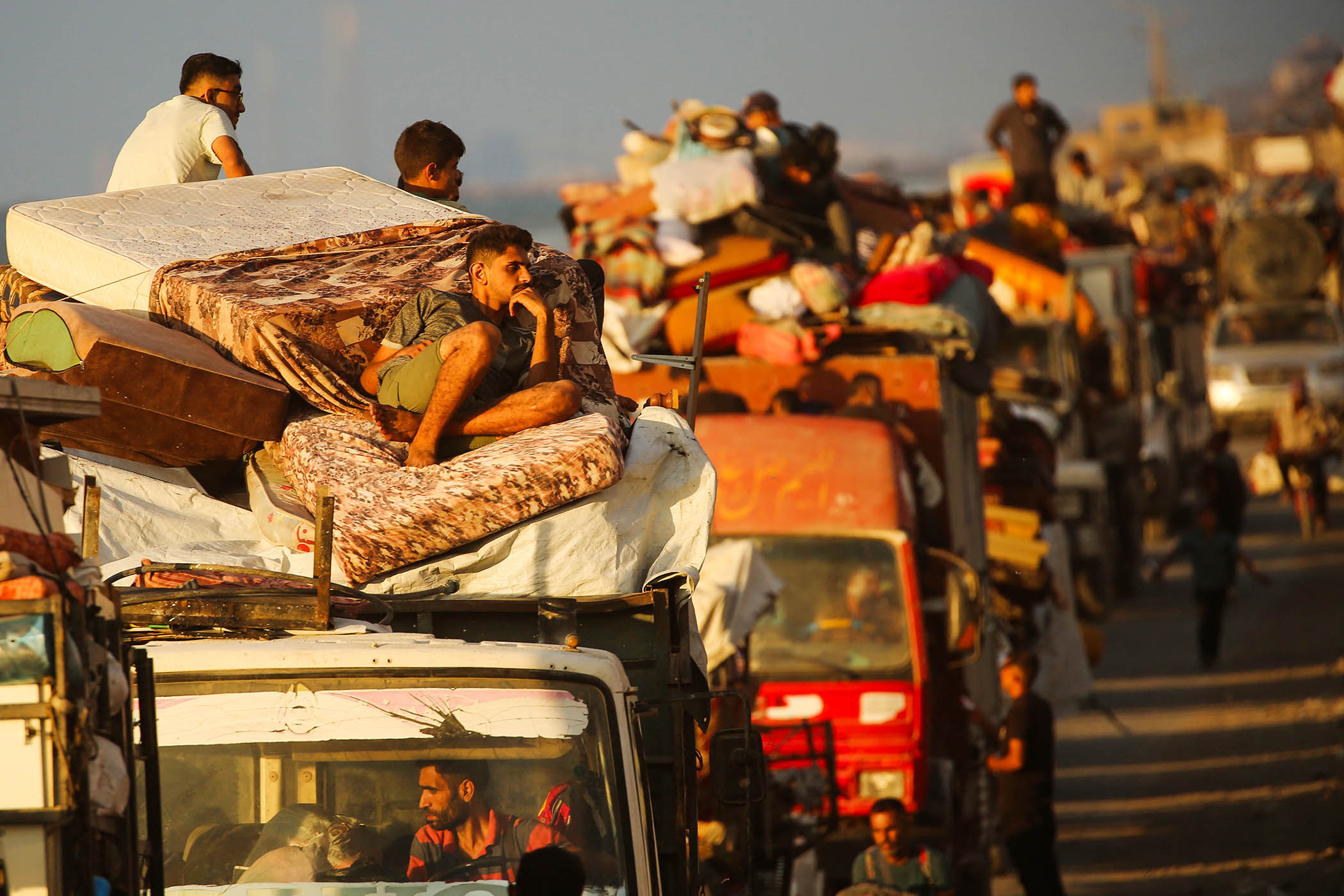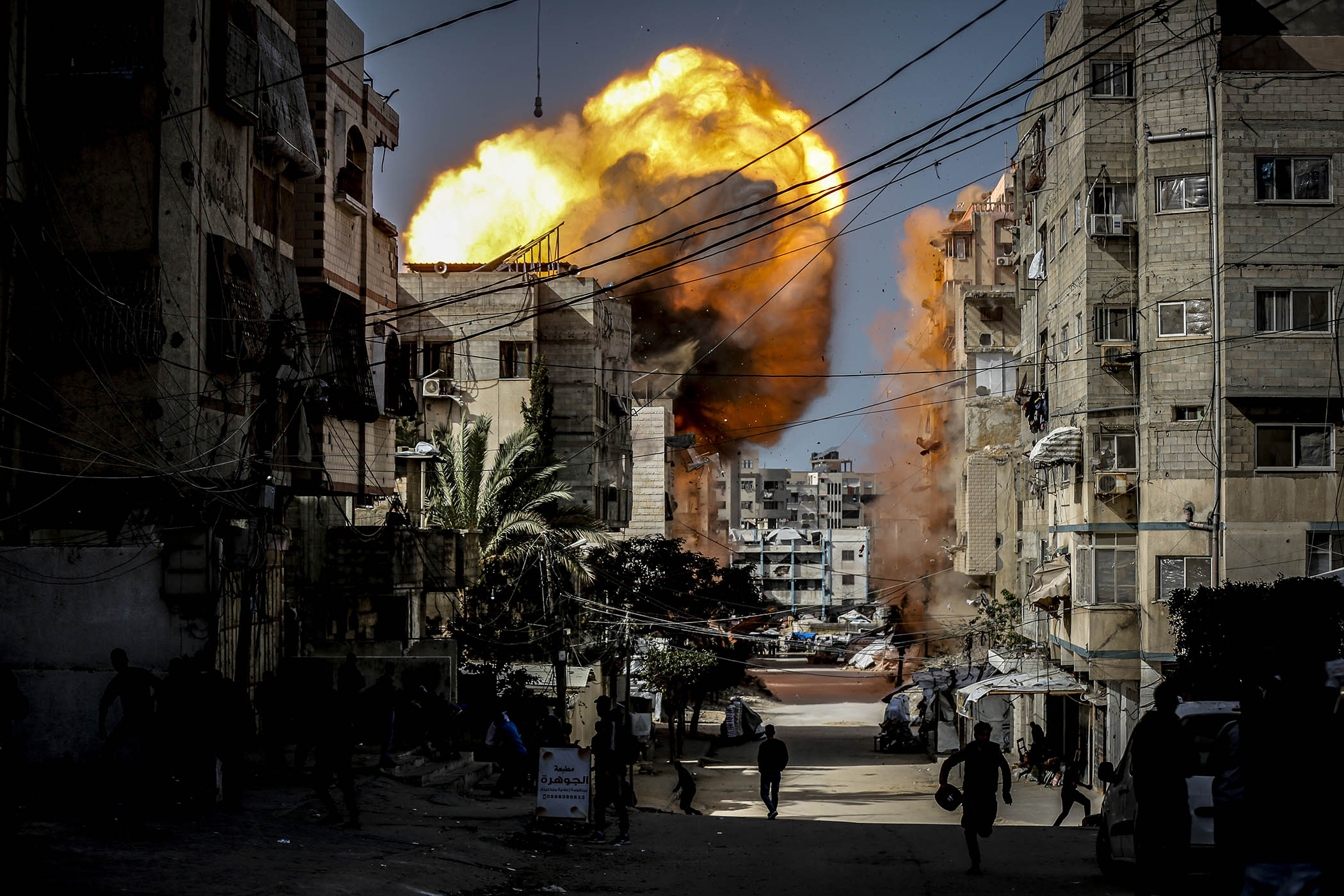A column of vehicles left Gaza City piled high with mattresses, plastic jerrycans and chairs. Tens of thousands of people crammed into cars. Some rode on roofs or hung on to the sides of trucks. Others were forced to pick up what they could carry and walked.
“This was about survival. But it’s like there was a weight bearing down on people, knowing that they had to say goodbye to their homes,” said Hassan. His sister and their elderly parents rode with him inside a truck full of their belongings: there was so little space that his brother endured the hours-long journey on the roof, or clinging to the back of the truck, alongside a pile of boxes and mattresses, as he wept.
Still Hassan was relieved that he had finally found somewhere for them to go. He is considered fortunate. His job with the UN’s agency for Palestinian refugees means he can afford to pay for a roof over his head – rents are soaring all over Gaza as hundreds of thousands flee. Hassan last spoke to The Observer two months ago to describe his struggle to survive famine, even on a UN wage. His name has been changed.
It took Hassan weeks to find an apartment in Gaza’s middle area before his family could flee. He frantically texted and called any landlord he could find. Then he struggled to find any means to transport them all south of the Gaza River.
“It was insane. They kept telling us to flee south and I wanted to. But how can we go, with no transportation, no fuel and basically no roads?” he said. At one point, Hassan grew so desperate to find a vehicle that he went out into the street in Gaza City and began trying to stop any car he could find. As he begged and offered vast sums of money in the hope that a driver might accept, there was an airstrike on a tent close to his building.
“I came back and found bodies and a lot of injured people in front of my house. Had I arrived a minute later, I'd be like them,” he said.
Eventually he found a driver with a flatbed truck who agreed to take them – for a fee of 2,700 shekels, more than £600 – and they joined the long line of cars filling the only road out of Gaza City late one evening. It took Hassan and his family eight hours, inching along, to drive a distance that would have taken 20 minutes before the war.
What overwhelmed Hassan was the acrid smell. No fuel has entered Gaza for months, so people stopped their cars regularly to pour cooking oil into the engines to make them run. The odour filled the air and a white cloud surrounded the vehicles. The smell was so bad that Hassan’s father vomited during the journey. Anyone forced to walk alongside the cars had to navigate watery sewage that pooled in the dirt by the side of the road.
“The sound of shooting and bombing was incessant, the noise of the malfunctioning engines, the shouting and screams and bullets the whole time,” said Hassan.
The Israeli assault on Gaza City began with bombings targeting the concrete towers that once marked skyline of the metropolis. Bombs pounded neighbourhoods previously teeming with markets, clusters of tents and what remained of people’s homes.
Newsletters
Choose the newsletters you want to receive
View more
For information about how The Observer protects your data, read our Privacy Policy
The United Nations human rights office (OHCHR) tracked Israeli airstrikes on residential towers, noting: “Reports indicate that almost all those killed are civilians.” The deadliest single strike on a cluster of tower blocks killed 20 members of the same family, including 12 children. The UN said the strike took place without warning. Dozens were missing under the rubble.
Israeli attacks, the OHCHR said, “are driving Palestinians out of Gaza City, while the destruction of their homes is making it likely that this displacement will be permanent”.
UN data suggests that more than 150,000 people fled Gaza City within seven days earlier this month. As more bombs struck the city, tanks and ground troops moved in. Hamas and the Palestinian Islamic Jihad claimed attacks on advancing Israeli forces in western Gaza City, signalling the start of fierce street battles.
“The great force of the attack is here,” warned Israeli defence minister Israel Katz. “We want to take control of Gaza City because today it is Hamas’s main governing symbol. Today, if Gaza falls … they will fall.”
‘There was a weight bearing down on people, knowing they had to say goodbye to their homes’
‘There was a weight bearing down on people, knowing they had to say goodbye to their homes’
Hassan, Gaza City resident
Hassan questioned the military rationale for the assault on his hometown. “This is not about military targets or Hamas. It's about demolishing people’s houses,” he said.
The truck that he and his family rented to take them to Deir al-Balah in Gaza’s middle area was unable to navigate a slope south of the Gaza River and broke down. In the middle of the night, Hassan resorted to finding someone with a tractor. He and his family heaped their belongings on top, and Hassan drove it the final stretch.
Their destination was an apartment still under construction. It has doors, no windows, tiles only on the floor, but Hassan was relieved to hand over thousands of shekels in cash to rent it. He paid almost £900 for one month. “Who can afford this sum?” he asked.
“Most buildings in the entire Gaza Strip are totally or partially destroyed. Finding a roof over your head is hard, especially with these waves of hundreds of thousands who cannot find shelter.”
No tents have entered Gaza since the start of an Israeli blockade in March, and even tarpaulins that make haphazard shelters come at a premium.
“My friends keep telling me I am lucky to have a roof over my head as this is much better than the alternative,” Hassan said. After checking online, he saw that buying a tent costs the same as his monthly rent.
He and his family have been exhausted since they arrived. But there has been little chance to rest. First they began a search for any source of water, which took hours. Then they went looking for wood to start a fire.
“No one can live like this,” he said. “We were forced to run, losing our will to live – all to reach a destination where things are uncertain there too.” Gaza City is one of the oldest inhabited areas in the world. It was a key port on a busy trade route for thousands of years. Dense clusters of tower blocks surround centuries-old palaces, bath houses and mosaics that nod to this heritage. Gazans fear the fresh Israeli attack is intended to turn a once proud metropolis into a ghost town, or level it altogether; one airstrike destroyed the pale-stone minaret of the Al-Aybaki mosque that had stood since the 13th century.
Like Hassan, it took Sondos Jabr and her family days to flee Gaza City. When Sondos spoke to The Observer two weeks ago, she described agonising over whether she and her family could afford to leave. The choice weighed on her as she tried frantically to decide whether they should flee immediately, despite having nowhere to go.
Staying meant waiting for the situation around them to get worse under intensifying bombings or even the presence of Israeli ground troops. What changed Sondos’s mind was seeing her children weep with fear as the bombs drew closer.
“The situation was unbearable in every possible way,” she said. “Every choice was bitter.”
The journey to Al-Zawayda, an area just south of the Gaza River, took Sondos, her elderly parents, her husband and their two young children 12 hours. Renting a car cost the equivalent of £670.
Sondos and her five-month-old daughter Aysal choked on the smell of burnt cooking oil. Her children were too cold to sleep inside the car. One night they slept on the beach where the chill made them all even sicker.
Their car also ran out of fuel and needed to be towed part of he way. That cost another £225.
Reaching the area south of the river proved even more expensive. The Jabr family crammed into a friend’s apartment, all six of them in one room.
“This single room is now our living room, bedroom, kitchen and everything else,” said Sondos. Rentals nearby can cost far more than they can afford. A friend of hers has paid the equivalent of £400 to rent a warehouse with no bathroom.
Even pitching a tent costs money, in some places to pay those who own the land or elsewhere to gangs that have taken over in the vacuum left by Hamas. Sondos noted that people are paying 600 shekels (about £130) to pitch a tent on land opposite the apartment where her family is staying.
Safety has remained elusive. “There’s still no safe place, including here in Al-Zawayda. People call this a safe zone, but yesterday there were Apache helicopters in the sky. They bombed nearby,” said Sondos.
Photograph by Eyad Baba/AFP




